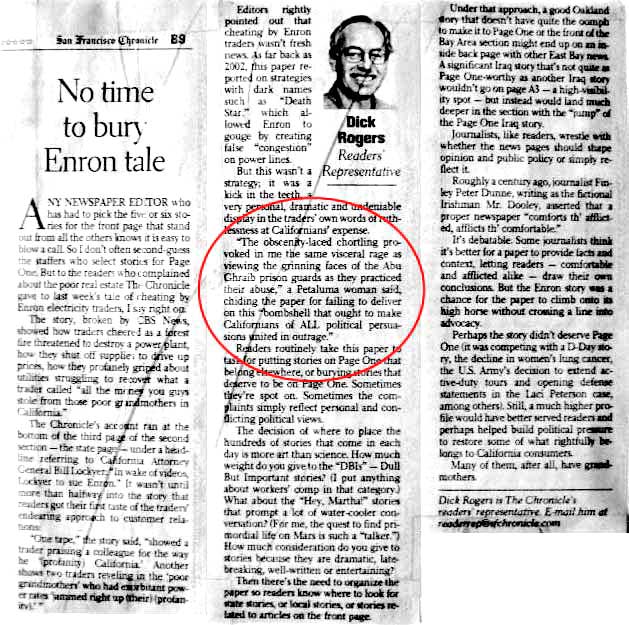
No Time to Bury Enron Tale
- Dick Rogers,
Readers' Representative
SF Chronicle | Friday, June 11, 2004
ANY NEWSPAPER EDITOR who has had to pick the five or six stories for the front page that stand out from all the others knows it is easy to blow a call. So I don't often second-guess the staffers who select stories for Page One. But to the readers who complained about the poor real estate The Chronicle gave to last week's tale of cheating by Enron electricity traders, I say right on.
The story, broken by CBS News, showed how traders cheered as a forest fire threatened to destroy a power plant, how they shut off supplies to drive up prices, how they profanely griped about utilities struggling to recover what a trader called "all the money you guys stole from those poor grandmothers in California."
The Chronicle's
account ran at the bottom of the third page of the second section -- the state
page -- under a headline referring to California Attorney General Bill Lockyer:
"In wake of videos, Lockyer to sue Enron." It wasn't until more than
halfway into the story that readers got their first taste of the traders' endearing
approach to customer relations:
"One tape," the story said, "showed a trader praising a colleague
for the way he '(profanity) California.' Another shows two traders reveling
in the 'poor grandmothers' who had exorbitant power rates 'jammed right up (their)
(profanity).' "
Editors rightly pointed out that cheating by Enron traders wasn't fresh news.
As far back as 2002, this paper reported on strategies with dark names such
as "Death Star," which allowed Enron to gouge by creating false "congestion"
on power lines.
But this wasn't a strategy; it was a kick in the teeth, a very personal, dramatic and undeniable display in the traders' own words of ruthlessness at Californians' expense.
"The obscenity-laced chortling provoked in me the same visceral rage as viewing the grinning faces of the Abu Ghraib prison guards as they practiced their abuse," a Petaluma woman said, chiding the paper for failing to deliver on this "bombshell that ought to make Californians of ALL political persuasions united in outrage."
Readers routinely take this paper to task for putting stories on Page One that belong elsewhere, or burying stories that deserve to be on Page One. Sometimes they're spot on. Sometimes the complaints simply reflect personal and conflicting political views.
The decision of where to place the hundreds of stories that come in each day is more art than science. How much weight do you give to the "DBIs" -- Dull But Important stories? (I put anything about workers' comp in that category.)
What about the "Hey, Martha!" stories that prompt a lot of water- cooler conversation? (For me, the quest to find primordial life on Mars is such a "talker.'') How much consideration do you give to stories because they are dramatic, late-breaking, well-written or entertaining?
Then there's the need to organize the paper so readers know where to look for state stories, or local stories, or stories related to articles on the front page.
Under that approach, a good Oakland story that doesn't have quite the oomph to make it to Page One or the front of the Bay Area section might end up on an inside back page with other East Bay news. A significant Iraq story that's not quite as Page One-worthy as another Iraq story wouldn't go on page A3 -- a high-visibility spot -- but instead would land much deeper in the section with the "jump" of the Page One Iraq story.
Journalists, like readers, wrestle with whether the news pages should shape opinion and public policy or simply reflect it.
Roughly a century ago, journalist Finley Peter Dunne, writing as the fictional Irishman Mr. Dooley, asserted that a proper newspaper "comforts th' afflicted, afflicts th' comfortable."
It's debatable. Some journalists think it's better for a paper to provide facts and context, letting readers -- comfortable and afflicted alike -- draw their own conclusions. But the Enron story was a chance for the paper to climb onto its high horse without crossing a line into advocacy.
Perhaps the story didn't deserve Page One (it was competing with a D-Day story, the decline in women's lung cancer, the U.S. Army's decision to extend active-duty tours and opening defense statements in the Laci Peterson case, among others). Still, a much higher profile would have better served readers and perhaps helped build political pressure to restore some of what rightfully belongs to California consumers.
Many of them, after all, have grandmothers.
Dick Rogers is
The Chronicle's readers' representative. E-mail him at readerrep@sfchronicle.com
Page B - 9
URL: http://sfgate.com/cgi-bin/article.cgi?file=/chronicle/archive/2004/06/11/EDG1O73K6U1.DTL
©2004 San Francisco Chronicle
